Professor Anand Menon recently published a paper for UK in a Changing Europe (UKICE) stating that there was no political advantage for Labour or Conservatives in focusing on Brexit as an election issue. I know Anand, having met and spoken with him at events on quite a few occasions. As a fellow academic, this gives me the right to challenge him. I’m sorry mate, but you have confused political expediency with political leadership. Let me explain:
UK in a changing Europe’s research states that neither the Conservatives nor Labour stand to gain much from focusing on Brexit. We know that the word Brexit has gone out of circulation, primarily because (a) hardly any of the political parties want to talk about Brexit and many have demonised party members from even uttering the word (b) the media has a virtual blackout on the word Brexit, preferring ‘global factors’ as a euphemism for the lived experience of the British Brexit people (c) many families and friend circles do not wish to reopen the toxic conversations that characterised the Brexit referendum. It’s a particularly English condition to sweep difficult conversations under the carpet. But, and it’s a very BIG BUT …
Not talking about Brexit does not make Brexit go away
Leaving the Brexit conversation undone is what therapists call ‘unfinished business’ or ‘closure’, rather like an angry boil that is left to fester. Unless the Brexit boil is popped, it will continue to haunt families with its puss for a generation. UKICE have of course published many fine articles and studies that point out that Brexit is far from done, with many further ‘bumps in the road’ to come. This is why a new conversation about Brexit and Europe is needed. Also why I advocate an active rather than a passive approach to difficult conversations about Europe and Brexit (a passive approach is simply waiting for granny and grandad Brexit to die). This is what I call ‘Brexorcism‘.
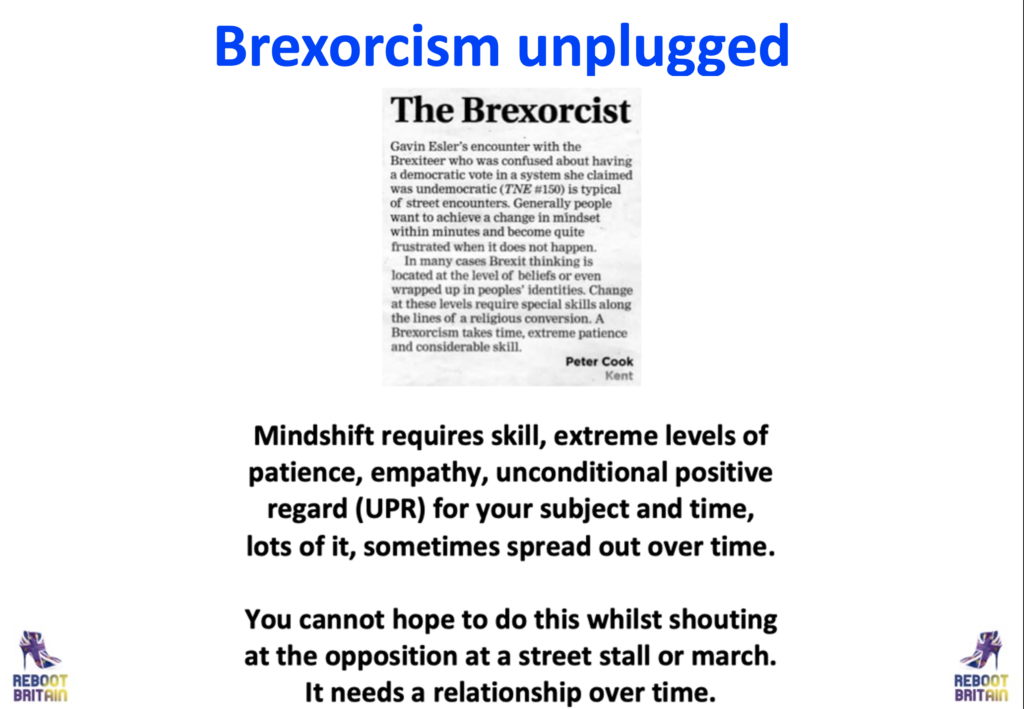
Join us for a free masterclass on Brexorcism
Brexit’s offspring are being talked about
Whilst mentioning the B word may not be a vote winner according to Menon, all the ‘offspring’ of Brexit are being talked about as voter priorities. Like it or loathe it, all of the issues on our Brexit iceberg have their roots, fully or partly in Brexit.
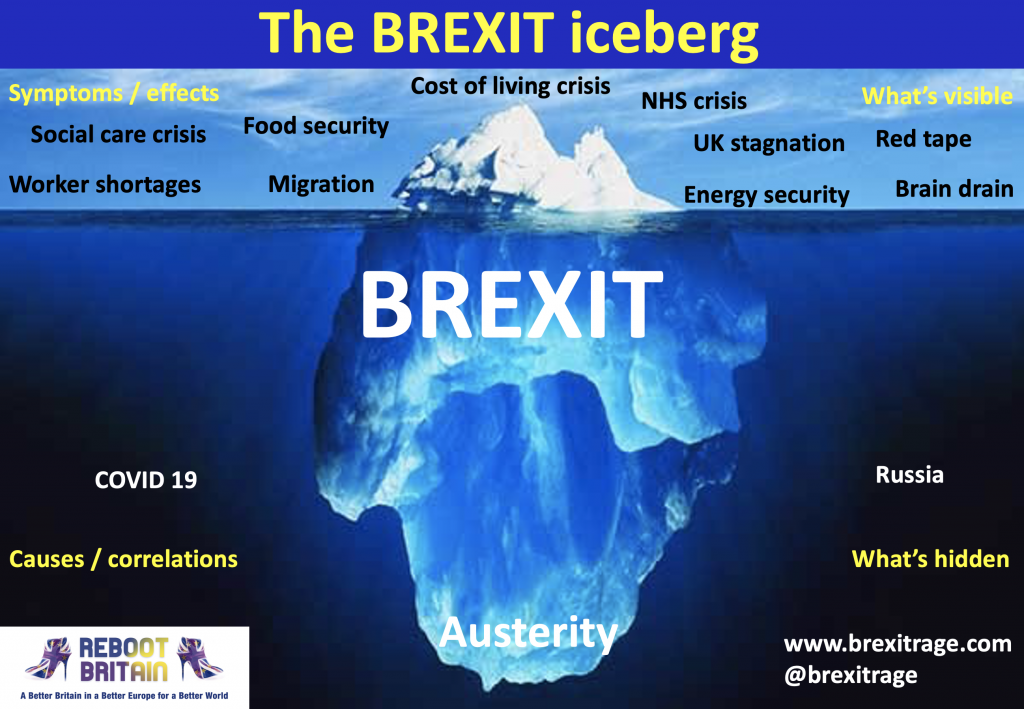
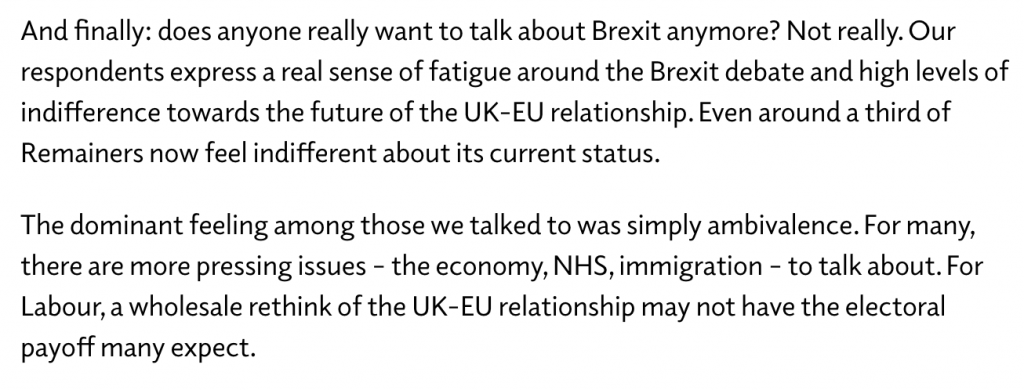
Political expediency versus political leadership
Menon is right from UKICE polling data that it may not be politically expedient to mention Brexit. Expediency is not importance however. Two things occur to me:
Firstly and most importantly, political leadership is not about constantly responding to polls about the here and now. This is in effect driving through the rear view mirror. Leadership is about synthesising long-term decisions and short term actions to lead people towards better futures. OK, of course I realise that UKICE is not OK Magazine, but I feel that Menon has conflated expediency with leadership. As a leader, Keir Starmer et al. should be in the business of explaining the connections between our ‘Brexitberg’ elements (NHS collapse, cost of living, migration, UK stagnation, business collapse, lost trade, friction, food shortages, sector specific staff shortages, brain drain etc.) with Brexit. Starmer has stated that he wants to deal with root causes and not symptoms of our problems. Brexit is at the heart of Britain’s decline.
Secondly, snapshots are just that. A snapshot in time. I recall that Menon was first talking about this research at a UKICE event way back in 2022. The focus groups were conducted in Brendan Clarke-Smith’s constituency of Brexity Bassetlaw, Thurrock and Lee Anderson’s constituency of Ashfield !!! This knocks the qualitative findings out of the park in terms of validity. What possessed Public First aka Britain First in choosing these areas and not a mixed sample? And why did UKICE decide to use them for this research? The quantitative poll of 4005 people is now nearly 6 months out of date, so the dataset is also of dubious value. We are nearly at the point where 2/3 of the population accept that Brexit has failed and within striking distance of 70%
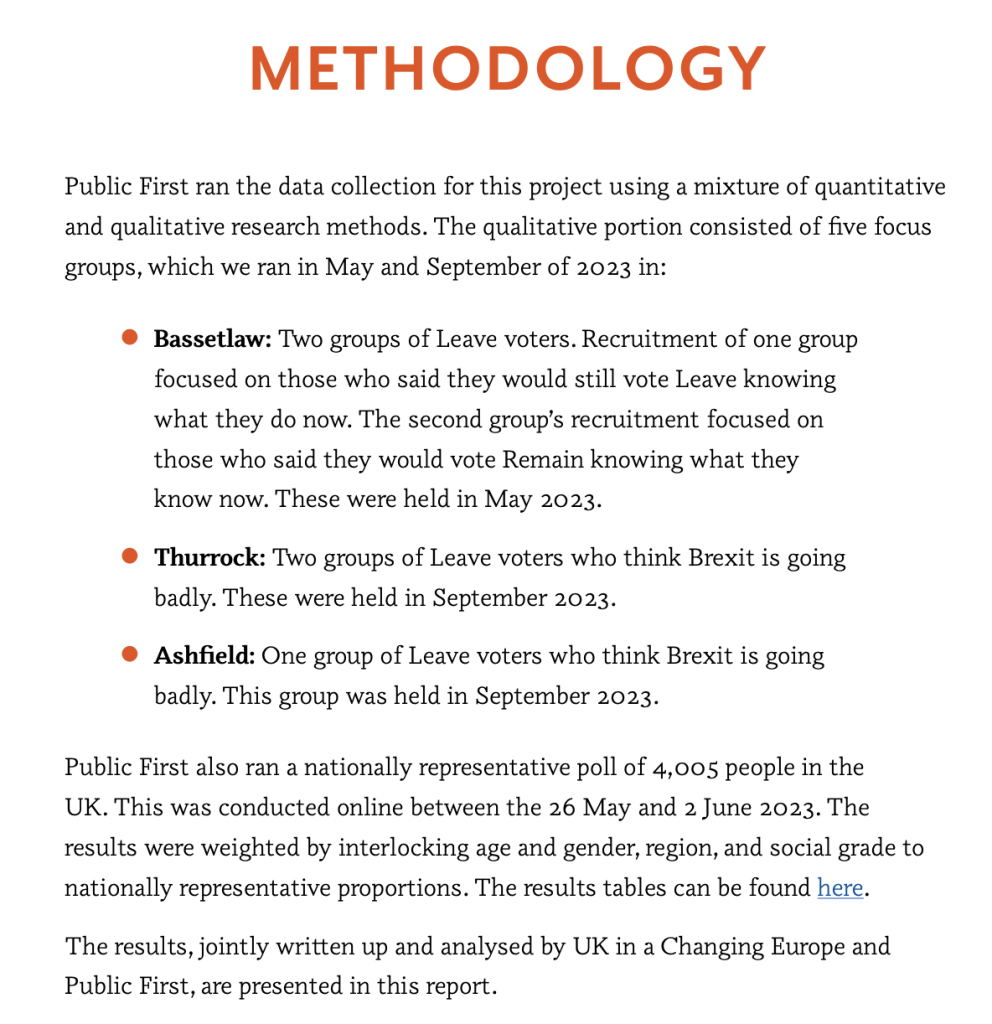
Leaders synthesise long-term decisions and short term actions for better futures
Yes, people in Bassetlaw and Thurrock can argue that Brexit realities are the fault of the Tories not being Brexity enough (although I’m at a loss to understand how much more Brexity Johnson, Truss and Sunak’s puppet cabinet could have been), or that Remainers have ‘thwarted’ a true Brexit (I never knew I had so much power, having been ignored by MPs on all sides etc.). Nobody knows or agrees on what a true Brexit would have been and certainly an immediate exit via WTO would have left us with a 10-12% GDP deficit compared with the 4.5% we currently have. This would have been catastrophic. I predict that we will soon reach a point where 70% of people accept that Brexit has failed, even if the B word has been airbrushed out of public discourse. People are not stupid and, like it or not, Brexit and the offspring of Brexit will remain on or under the table as election issues, especially if people keep the conversation going about Brexit. Learn how to do it here:
Why this matters
In my humble opinion, Menon is feeding Remainers and Rejoiners a false narrative. Having met Anand quite a few times, I sense he is at best a fence sitter on the subject of Brexit in order to keep in with his politicos on both sides of the debate such as David Frost and others. Some tell me that he is a closet Brexiteer, which would explain his misleading conclusions from the research.
The not so secret Labour ‘promise’ to look at Brexit again in 2032 is also another unicorn designed to put Remainers and Rejoiners to sleep. See Faulty Towers for more on Labour’s disingenuous Brexit strategy. Sorry Anand, I expect better from a professor who should know the difference between political expediency and political leadership. I look forward to a conversation about the matter.




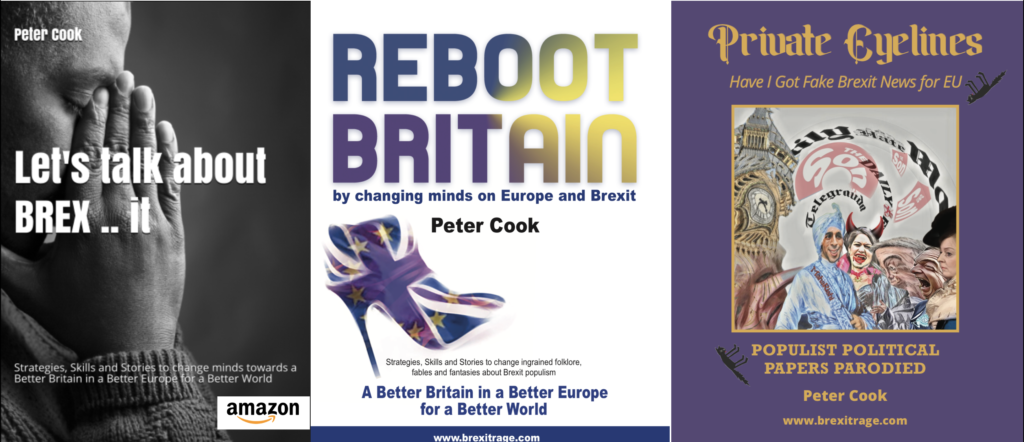

[…] Read Deceptive Bends […]